We searched long and hard through the treacherous backend roads of the Internet, with the aim of brushing up your knowledge on the best Western novels ever written by straight-shooting Western authors.
What defines Western books?
The Western genre is uniquely American, and usually set in the U.S. Old West during the late 18th and 19th century. Western books often tell stories of cowboys, outlaws, the frontier, and the Wild West while exploring themes such as justice, individualism, and freedom.
Cowboys aren’t much for small talk, so we’ll get to the point: Here is our list of the best Western books by category. Feel free to disagree—but if you do, expect to be challenged to a good ol' Western showdown.
Best Historical Fiction Western
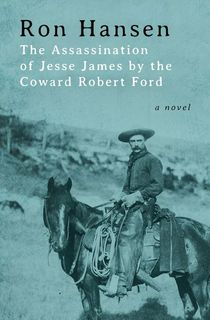
The Assassination of Jesse James by the Coward Robert Ford
It’s difficult to quantify the lure of the outlaw, that often sympathetic villain who blurs the lines between compassion and disgust, right and wrong. No one epitomizes that contrasting image quite like the outlaw Jesse James, a preacher’s son who became a famous bank robber and murderer—and no tells his story quite like famous Western author Ron Hansen in The Assassination of Jesse James by the Coward Robert Ford.
Best "You've Probably Never Heard of It" Western
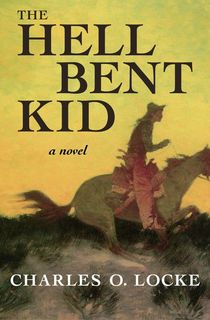
The Hell Bent Kid
A classic chase narrative weaving themes of revenge and the loss of innocence, The Hell Bent Kid, by Charles O. Locke, chronicles the escape of teenager Tot Lonham through the heart of Texas with the vengeful Boyd family in hot pursuit. First published more than 50 years ago, it was made into a movie called From Hell to Texas, starring Don Murray and directed by Henry Hathaway.
Best Nonfiction Western
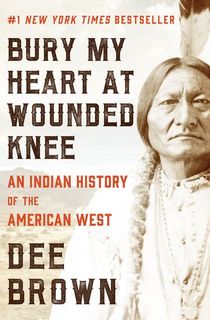
Bury My Heart at Wounded Knee
“Bury my heart at Wounded Knee,” writes poet Stephen Vincent Benet in his poem “American Names.” It’s a phrase that author Dee Brown makes literal in his nonfiction books of the same name. In this historical book, Brown recounts the tragic massacre of the Native American tribes in the late 1800s, honestly and provocatively giving a voice to a moral horror that America too often tries to hide.
Best "Old School" Western
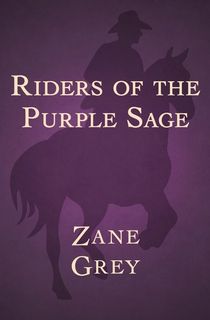
Riders of the Purple Sage
Before there were the best Westerns, there was the Western, a novel called Riders of the Purple Sage, by Zane Grey, that is often credited for truly kick-starting the Western as a genre. It is the story of Jane Withersteen, a Utah rancher whose livelihood is threatened by a proposed marriage she does not want, until a lone cowboy named Lassiter comes to town.
Best Romantic Western

Lonesome Dove
If the dove is a symbol of peace, the characters of Lonesome Dove, by Larry McMurtry, have yet to find it. Centered around the lives of disgruntled former Texas Rangers Gus McCrae and Woodrow Call, this is a tale of despair and redemption, of love lost and found and lost again in the American West.
By the way, this novel also won the 1986 Pulitzer Prize for Fiction.
Best "Shoot 'Em Up" Western

Blood Meridian
Often there is a kind of glory given to the gun-slinging culture of the Wild West. But what if you removed that hint of glory? Then you would have the incredible (and incredibly grim) Blood Meridian, by Cormac McCarthy, which skips cattle drives and riding off into the sunset in favor of gun and arrow shooting, scalping, and breaking bottles over the heads of bartenders—it's an Old West where heinous acts of violence reign supreme.
Initially, Blood Meridian didn't garner much interest from critics or book buyers. But since its publication in 1985, it's become highly acclaimed and one of the top selling Western books ever written.
Best "Dynamic Duo" Western

The Sisters Brothers
Contrary to their last name, Charlie and Eli Sisters are, well, brothers. They are also some of the best hit men in the Wild West, commissioned to kill a man who possesses a peculiar formula that can reveal the location of gold in riverbeds.
The darkly comic The Sisters Brothers, by Patrick deWitt, was shortlisted for the Man Booker Prize in 2011.
Best "Life on the Frontier" Western
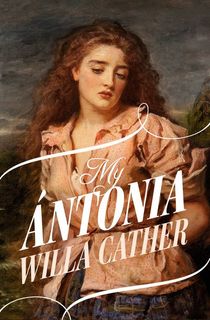
My Antonia
Set in the Nebraska plains, My Ántonia, by Willa Cather, is the story of Ántonia, a woman who finds herself in a situation that is doubly strange. Once, because she is a foreigner knowing little English who has come with her family to the United States, and twice, because within the United States, she has come to the frontier, a land strange and unknown to even the Americans who live there. But her struggle to persevere in this unusual frontier land is an inspiration to all.
Best "Lone Wolf" Western

Hondo
Louis L’Amour is so successful an author that he once wrote a movie novelization still revered in Western literature more than 60 years after the movie first came out.
In Hondo, a lone, rogue cowboy who is no stranger to murder enters the house of a married woman and her child—and their lives will never be the same again.
Best Children's Western

Little House on the Prairie
Aside from dying of cholera in the Oregon Trail video game, reading Little House on the Prairie, by Laura Ingalls Wilder, has been a childhood staple for generation upon generation—it's the first great Western that most of us read.
Set in the late 1800s, this fictional novel, based in part on the author’s own experience, is the story of the Ingalls family and their life on the Kansas prairie, detailing the hardships and pleasures of a family in the untamed West.
Best "Revenge Tale" Western

True Grit
Mattie is just your typical 14-year-old. That is if your typical 14-year-old girl’s father had been murdered and robbed by a man named Tom Chancey and said typical 14-year-old girl would stop at nothing to get vengeance for her father’s death. Such is the fast-paced, thrilling story of Mattie in True Grit, by Charles Portis.
Best Story Behind the Western
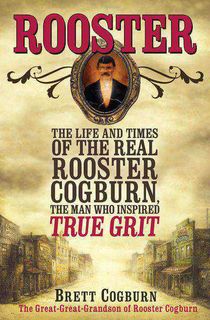
Rooster
Yes—Rooster Cogburn, the man with “True Grit,” was a real person. Though Charles Portis’s character was also inspired by other figures, such as one-eyed Deputy Marshal Cal Whitson, a good portion of the brash character was based on the man whom he named him after: Franklin “Rooster” Cogburn.
In this biography by his great-great-grandson, Cogburn tells us all about the legendary cowboy, outlaw and moonshiner.
Best Complicated Western
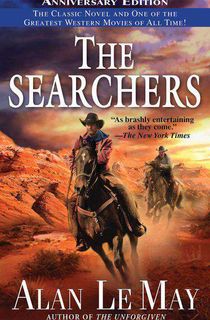
The Searchers
The story of men searching for women kidnapped by Native Americans isn’t a unique one in Westerns. In fact, Le May based his book on the real life story of Cynthia Ann Parker, but his version of the thorny tale stands out because of its unparalleled depth and emotion.
Like a few other books on the list, this Western novel was later turned into a film starring John Wayne. John Ford's masterpiece is now widely considered one of the best Western films of all time, and certainly one of the best movies based on books.
Best Western Noir
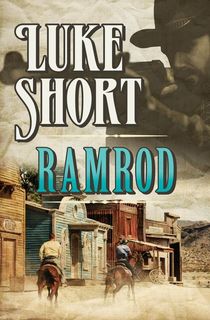
Ramrod
Though Luke Short wrote many Westerns, some of which were made into films in the 1940s, Ramrod stands out as one of his finest. The classic story centers around Dave Nash, who owes his livelihood to his boss, Walt Shipley.
Shipley has married Connie Dickason, the most seductive woman in town. But when Shipley is driven out of town, it’s up to Nash and Connie to defend his ranch together—and Nash soon sees that Connie may be the most dangerous player of them all.
Best "Most Likely to be a Modern Classic" Western

The Son
If the dramatic nature of “Don’t Mess with Texas” was bundled up into one family history and written into a book, then that might come close to describing The Son, by Philipp Meyer.
This epic story of family, oil, blood, and tragedy alternates between three characters from the late 1800s to the late 1900s, and has been highly praised.
Best Original Western
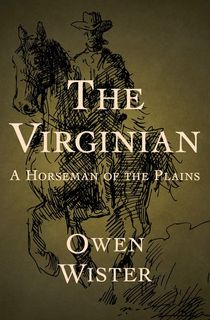
The Virginian
First published way back in 1902, Owen Wisters’ classic novel is often considered to be the first true Western. The trailblazing book kicked off America’s love of the Old West and made way for authors like Zane Grey and Louis L’Amour.
In the story, the eponymous “Virginian” befriends the unnamed narrator (nicknamed "the tenderfoot"), and together the two journey three hundred miles to a ranch. Along the way, the Virginian exemplifies the romance, stoicism and principles that have come to define the genre.







